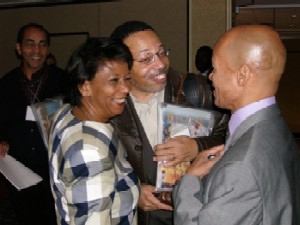 |
| Ms.Darlene Lawrence, Dr.George Elliott Clarke and Prof.David Divine at the conference. |
The verdict is in: Multiple Lenses: Voices from the Diaspora Located in Canada, the groundbreaking conference on Black Canadian issues recently hosted by Dalhousie, was an unequivocal success. "It exceeded all expectations," said David Divine, the James R. Johntson Chair in Black Canadian Studies, who spent a full year planning the event. "We hoped to have 350 delegates (at the event) and that was very ambitious. In fact, we had nearly a hundred more."
The conference, which took place over the course of three days, brought together individuals and organizations from across the country. The event featured speakers from dozens of different fields, including public servants, spiritual leaders and politicians, said Prof. Divine. "To have nationally significant and internationally recognized presenters, 57 of them in one room, all of whom would normally have an entire conference devoted to themselves as a single keynote, is an extraordinary feat."
Prof. Divine pointed out that the conference offered an opportunity to network, paving the road for future business relationships and intellectual collaboration. He also noted the financial impact of the conference on the community. "If you have 420 delegates at a conference, you're talking about hundreds of thousands of dollars coming into the local economy."
Although these concrete consequences of the conference are important, many of those in attendance chose to focus on the underlying significance of its organization. During his lecture, Terry Roswell, a professor at Ryerson who is currently completing his doctoral research on race and crime at the University of Toronto, addressed the issue of the inequitable treatment of black Canadians by the Toronto media and police force. Likening the fight to overcome such challenges to being at war, Roswell emphasized his conviction that the battle is not a losing one. He concluded his speech by saying that "being in the trenches, sometimes it is easy to lose sight of hope, but" he continued, "there is hope, and this conference is a sign of that hope."
Prof. Divine believes it is this sense of optimism, strengthened by positive examples of what black Canadians can achieve that is most important to convey to the public. This is especially true for today's black Canadian youth. "(The students in attendance) said they were blown away by the sheer calibre of the presenters. They did not know there were such powerful, authoritative black figures who could speak so eloquently and passionately about their subject matter." Exposed to an atmosphere of community and accomplishment, the students left with a "positive image of what can and has been done."
Prof. Divine, for one, is quite hopeful for the future. "I honestly felt at the end that I have no doubts about the future of our young people. I know with enormous confidence that they are going to pick up the baton from those of us working now, and they will do an even better job."
